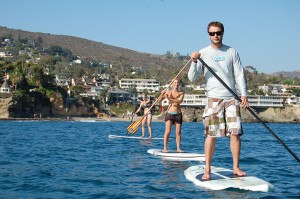
Laguna Beach’s City Council on Tuesday will consider potential regulation of stand-up paddling instruction due to complaints stemming from the surge of companies offering lessons on public beaches.
In a letter sent to council members last November, owners or managers of four local shops involved with surf and paddleboard rentals or instruction decried the plethora of new companies that have “sprouted on our beaches, creating an intensification of use, and a stress on the system. We fear for the safety and security of our respective businesses, as well as Marine Safety’s ability to monitor it.”
Resident complaints prompted staff from the city’s marine safety, code enforcement and community services departments to monitor group SUP instruction on city beaches beginning last summer, and their findings, compiled in a recent memo to the City Manager John Pietig, seem to corroborate concerns voiced by the operators of some local surf shops.
Increased SUP instruction creates a strain on lifeguards, who, if bathers are present, must clear the water for a paddler’s exit and entry whether the paddler is on their own or participating in a group lesson, says the staff report by Ben Siegel and Kevin Snow, directors of the community services and marine safety departments respectively.
Lifeguards also may have to assist some paddlers through the surf line, helping them to stay clear of hazardous areas. This can be very time-consuming when there are a lot of paddlers on the beach simultaneously and diverts the lifeguards’ attention from their other safety responsibilities, the report says.
The sport’s 10-12 foot boards can be hazardous, especially when operated by novices, and they crowd the beaches and the water, say some residents, who have also complained of parking problems near beach access points resulting from vans transporting paddleboards for mobile operators. The report also notes various code violations such as storing private property on beaches, sale of goods and merchandise on the beach, and blocking of public access and emergency access ways.
In appealing to the council, La Vida Laguna’s Billy Fried, SUP Company’s Tommy Donnelly, Laguna Surf & Sport’s Jason Watson, Costa Azul’s Rod Greenup suggested restricting permitted commercial lessons to those who operate a retail store, effectively shutting out mobile-based operators.
“We believe this will create an effective barrier to entry for anyone that is not invested in the city, paying taxes, and creating jobs for locals,” they wrote in their letter.
The city attorney determined that such a requirement would invite litigation. And some operators might simply partner up with a local hotel or other brick and mortar business in order to skirt such a regulation, staff pointed out.
The staff has identified “at least eight” businesses offering commercial SUP instruction in Laguna, including the four with a physical presence. Though mobile-based businesses are required to obtain a city business license, the staff report points out there are likely many more operators than they were able to document, particularly in summer months.
Other coastal cities facing a similar surge in SUP popularity have found remedies through such options as SUP instruction through the municipal recreation program, where the city would work with an independent contractor to offer classes and share fees, allowing the city to strictly monitor safety conditions and hours of operation; a competitive process using requests for proposals to allow a limited number of operators to offer SUP instruction; a random lottery system to select one or more vendors; or a simple prohibition of all for-profit instruction on city beaches.
Another option would be to prohibit SUP instruction during certain hours of the day, in the same way that the municipal code currently prohibits SCUBA diving instruction from June 15 to Sept. 15 before 7 a.m. and after 10 a.m. on any public beach.
The staff report makes no specific recommendations, though it raises questions about whether other water-sport lessons such as kayaking, surfing and skim boarding should be similarly regulated and whether the ability to recover staff costs or even generate additional revenue should be a factor in proposed solutions.
Agenda item 16 seeks policy direction from the council on how to address the impacts of proliferating SUP instruction on city beaches.





[…] new regulations were intended to address safety concerns and mitigate neighborhood nuisances, stemming from an explosion in unregulated SUP companies […]